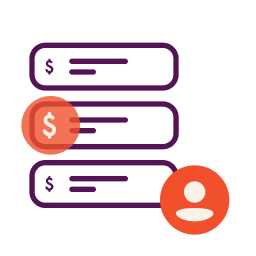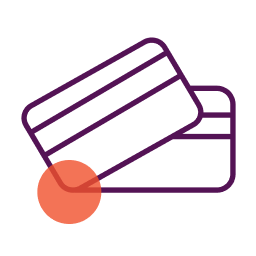If you’re looking to grow and sustain your business, opening a business checking account should be at the top of your to-do list. Having a business bank account that’s separate from your personal account allows you to more easily keep track of your money and process financial transactions.
But finding the right bank account is crucial. Nav’s Business Banking Survey showed that 93% of business owners interact with their banking institution on a weekly basis, so choose a bank account that has all the bells and whistles you need so it helps you run your business more smoothly.
Why is a Business Bank Account Important?
Keeping your personal and business finances separate is a key first step in making your business legit in the eyes of banks and lenders. Additionally, it reduces the problems you’ll run into doing your taxes and makes it generally easier to manage your financial life as a business owner.
Banks, credit unions and other lenders often want to see healthy cash flow before approving entrepreneurs for financing. They may ask for your recent bank statements to give them a clear picture of money coming in and going out of your business. Using a business bank account is the best way to give lenders that information.
Running your purchases, income, and expenses through a business bank account can help you avoid missing out on valuable tax deductions. If you use personal accounts, you may forget which purchases were made for personal use and which ones were made for business use.
It may also set you up for success. Nav’s Business Banking Survey also revealed that 70% of businesses lacking a business bank account that applied for financing in the past two years were denied. These businesses are also twice as likely to consider closing the doors on their business as those that do have a business bank account, stressing the importance of creating a clear separation in your personal and business finances.
What is Needed to Open a Business Checking Account?
If you’re looking for information on how to open a business bank account, start by knowing what information and documents you’ll need to open one. Whether you want to open an online business checking account or one in a brick and mortar bank, you’ll likely need any or all of the following:
- Valid identification (driver’s license, passport).
- Proof of address (i.e. two or more pieces of mail with your business’s name on it).
- Business license(s).
- Documentation of legal incorporation:
- General and Limited partnerships: Partnership Agreement showing business names and partners
- Limited Liability Corporations: Articles of Organization or Certificate of Formation
- Corporations: Articles of Incorporation or Certificate of Incorporation
- If you operate as a sole proprietorship, you won’t need this documentation.
- EIN. Although you can open a business checking account with your Social Security number, you’ll want to use your business’s Employer Identification Number (or “EIN”) if applicable. (Sole proprietorships can request EINs too.)
What to Consider When Choosing a Business Checking Account
The business banking study revealed that most business owners choose where they bank based on location and where they bank personally. With so many digital banking options these days, though, it may not be necessary to tie your business to a specific physical location.
Other important factors include:
- Cost. Free business checking accounts are popular, especially for startups or businesses with fluctuating revenues. They usually don’t earn interest, though.
- Perks. Business checking account perks may include sign-up bonuses or interest earned.
- Monthly transactions. Monthly transactions include cash and check deposits, cash withdrawals, and checks you write. For some banks, electronic payments are also included in this number. Most checking accounts limit the number of transactions you can make per month. Unlimited transactions may come with higher fees.
- Minimum balance requirement. Many of the best accounts have a minimum average daily balance required to avoid paying monthly maintenance fees. (There may also be a minimum opening deposit requirement.)The problem with maintaining a high average balance is that the money you keep in the account to meet that requirement is money you won’t be spending on either growing your business or investing in a source that will earn your dollars interest. Keep this in mind when choosing an account.
- FDIC Insurance. Yes, FDIC insurance can apply to business accounts. If this is important to you, look for the bank to identify itself as “member FDIC.”
Business Checking Account vs. Savings Account
If you have a sizable balance you may want an interest-bearing checking account, or an interest-bearing savings account. Offers for checking and savings accounts will vary by bank, but in general, business savings accounts offer the ability to earn higher interest rates (Annual Percentage Yield) on deposits. Sometimes they are offered as money market accounts which may have slightly higher rates but certain transaction limits.
What To Watch Out For When Choosing a Business Checking Account
As you choose a business bank account, you’ll want to watch out for these potential pitfalls.
Limited Features
Think about the features you’ll need in your business bank account. Do you need sub-accounts for budgeting and saving, for example? Will you deposit lots of cash? If so you probably don’t want an account that charges fees for excess cash transactions or with limited ATM access. Do you need to make wire transfers on a regular basis? If a bank won’t make that easy (or inexpensive) it may not be right for your business. The features you need will help you narrow your choices.
Confusing or High Fees
Even fee-free business bank accounts can have fees like the following, so read the fine print to be aware of what you could pay.
- Monthly service fee. This is usually waived for business checking accounts if you are able to maintain an average daily balance of a certain amount (varies by bank).
- Excess transaction fee. Most accounts will allow a certain number of transactions (varies depending on the bank and type of checking account you get). These fees range from $0.10-$0.50+ per transaction, so you’ll really want to know what you’ll be paying if you go over your monthly transaction limit.
- Cash deposit processing fee. Most accounts will allow a certain dollar amount for cash deposits before they start charging a fee—e.g., $0.30 per $100 cash deposited in your account.
- ATM fees. Many banks offer free ATM transactions within their network, but will for out-of-network ATM transactions. (And some banks will reimburse those fees.) Some banks charge money for using an ATM outside of their network of ATMs. If it’s important to you to be able to take out cash anywhere, consider an online business bank account where all ATM fees are waived, or a bank like BBVA Compass, which charges $0 for using an ATM outside of its network.
- Early account closing fee. Businesses that close their accounts within the first few months of opening may be subject to an early account closing fee.
- Paper statement fee. By signing up for electronic statements, your business may be able to save money.
- Wire transfer or ACH fees. Wire transfer fees are common amongst business checking accounts but can vary quite a bit based on whether the transfer is domestic or international, and an incoming wire or outgoing. If you plan to make international wire transfers, make sure you know these fees first.
- Overdraft fee. Should you make more purchases than the balance in your account can cover, you may be charged an overdraft fee.
These fees only scratch the surface of possible fees you might be charged. Read your bank’s disclosure statement for all possible fees.
Lengthy Application Process
How easy is it to open an account? Will you have to go in-person to a branch to complete paperwork? What types of documentation will be required?
Some documentation is unavoidable, and it may feel at times like the bank is asking a lot of questions. But some of those requirements are because financial institutions must follow certain banking regulations designed to prevent money-laundering.
Still, if a fast, streamlined application process is your goal, choose a bank that promises a simple online application. Also look for a bank that caters to your type of business. For example, business owners who are sole proprietors will want to find a financial institution that is eager to work with them and it’s more geared toward larger corporations or LLCs.
How to Choose the Right Checking Account for Your Business
Your business will have unique business needs, so ultimately, the best business checking account for you is the one that offers the account features that you’re looking for.
Business Debit Card
You may want business debit cards so that you and your employees can make debit card purchases for your business.
Business Credit Card
If you’re also interested in business credit cards, it might be smart to open your business checking account at a bank that offers business credit cards with competitive interest rates and rewards cards. Some offer perks like travel rewards or cash back, which can offset your card payments. Keep in mind, though, it’s perfectly fine to choose a business credit card not affiliated with your bank if the terms are more attractive.
Online Banking
Tech tools like online bill pay and mobile check deposits help save you time. Look for an online business bank account that offers robust business tools and a mobile app so you can check your account balance from anywhere. You may also want mobile deposit so that if you receive checks, you can then make business deposits from your phone. Or you may want invoicing features so your clients can pay by ACH.
Business Financing
If down the road, you want to apply for a small business loan or line of credit, it can help to have a relationship with the bank. Opening a checking or savings account for your business with that bank now could help you establish that relationship.
Location
For some businesses, it’s important to have nearby physical branches, especially for cash deposits, and a robust ATM network. Others are fine with totally online or mobile banking. Know what your needs are and choose a bank that can deliver.
Best Free Checking Accounts
Most banks that offer business checking accounts offer a way to waive the monthly account fee by maintaining an average daily or monthly balance of a specific amount. Some basic business checking accounts will even offer ATM fee reimbursement and free transactions such as free cash deposits.
Before you decide on a bank, consider this—it’s one of the easiest fees to waive, and even a small monthly fee can add up quickly.
Small Business Checking by Axos Bank routinely makes its way onto best business bank lists, and with good reason. It’s a low-cost option for small business owners featuring zero monthly maintenance fee, no minimum monthly balance requirement and no overdraft or NSF fees. You can even earn up to 1.25% APY. You can also get unlimited domestic ATM fee reimbursements. Best of all— it takes only $50 to open an account.
For business owners who want the option of going into physical branches, a business checking account with Bank of America can be a great choice. But you’ll need to meet specific requirements to avoid monthly service fees so be sure to read the disclosures carefully.
Novo offers simple business banking through their free checking account with debit card access, no hidden fees and zero minimum balance requirements. Novo allows you to integrate with the business tools you already use, like Xero and Wise, and empowers you with a dashboard to see the financial health of your business at a glance. Apply for an account in under 10 minutes from any device.
Bluevine Business Banking was built to empower small business owners with innovative financial solutions. A Bluevine Business checking account has no monthly maintenance fees, no NSF fees, and no minimum balances, plus you can earn a percent back on balances.
Chase has more than 4800 branches in the US, making it a great choice for business owners who want the option to go into a branch. (It also offers access to more than 16,000 ATMs.)
Chase offers multiple options to waive the monthly service fee, including maintaining a minimum daily balance or purchases on your Chase Ink® Business credit card, a popular small business credit card.
There’s also a welcome offer for new Chase business checking customers with qualifying activities. Earn $300 when you open a new Chase Business Complete Checking account.
FAQs about Small Business Banking
This article was originally written on May 1, 2018 and updated on February 27, 2023.



interested in opening an account
We hope the resources in the article will be helpful as you choose one.
I am trying to understand why my annual sales for equifax is saying 2,499,995.00? Why am I receiving an error when entering my Credit Union account? Why and how is my credit score on equifax 345? Last but definitely not least why does it have two different addresses and 10-24 employees? I have not received any communication from anyone, this is my 3rd attempt.
Please reach out to Nav customer support: support@nav.com. I’d suggest you call since you have multiple questions.
Very good information. Thank you!